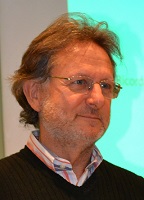MOLA, Dr Ernesto
Italy - family doctor

What work do you do?
I’ve been family doctor in Southern Italy for 39 years and I’m still at work in Lecce, a historical city of 90,000 inhabitants, and in a rural practice near the city. After graduation I specialized in Public Health and Preventive Medicine in Bari.
Since 2000, I’ve been involved both as a teacher and as coordinator of the interdisciplinary theoretical activities in the Vocational Training of Family Doctors, in Lecce.
Other interesting things you have done
I have a long involvement with the Trade Union of doctors
Confederazione Unitaria dei Medici Italiani (CUMI) as Secretary General from 1987 to 1994 and then from 1994 to 2004 as president.
From 2004 to 2008 I was the President of Interdisciplinary Scientific Association of both Family and Community Medicine – ASSIMEFAC, (affiliated with WONCA) and from 2008 until now I’ve been in ASSIMEFAC Coordinator of the Section Family and Community Medicine.
The over the past three years until 2017, I was the President of the Network of Italian Scientific Associations affiliated with WONCA.
I have an interest in overmedicalisation and medical harm. From 2010 to 2016 I took part as a representative of WONCA and a WHO consultant in some workshops and working groups with multidisciplinary panels on the topic of radiological risk from diagnostic radiation in patients. The last meeting held in Seoul concerned "CT in Asymptomatic People for Individual Health Assessment". In September 2017 I was on the Scientific Committee of the international conference in Lecce on Overmedicalization and Quaternary Prevention.
I have been involved in various research projects. In particular, I was the Project Leader of the Leonardo Project (about management of chronic conditions and patient empowerment), and one of the Coordinators of the Italian validation study of EUROPEP. I was also coordinator of several other Studies and surveys: “Interprofessional communication in health - CIS”; "Female Gender and Family Medicine"; “The educational needs of Italian doctors concerning radiologic risks”; “Hyper GP- Cross sectional study on arterial hypertension in the general practice setting”; "Comorbidity of the patients included in the Planned Home Care program”; “The perception of the over-medicalization issue by Italian doctors”. Most of them have been published as papers.
You have had a long involvement in WONCA activities.
I have been a representative on WONCA Council since 2004, and I have tried to bring my professional and scientific experiences to WONCA.
In WONCA Europe I was appointed as coordinator of a commission for a minor revision of the European Definitions of General Practice in 2012. The Commission proposed to include in the definitions an additional characteristic “(General Practice) promotes patient empowerment”. In 2015 I was a Special Advisor to the Project PECC-WE ("Patient Empowerment in Chronic Conditions - WONCA Europe") funded by WONCA Europe.
What is it like to be a family doctor in Italy?
In Italy, Family Practice is really adherent to the
WONCA Europe Definition of General practice /Family Medicine
We are the front-line in the national health service, we deal with all health problems and have a holistic approach to the patients. Important differences with most other European countries are that children under six years old are cared for by paediatricians and that our post-graduate education in family medicine is a Vocational Training in family medicine, not a university specialisation.
Family medicine in Italy should be more oriented to manage chronic conditions, better organized to answer the increasing demand of health and better integrated with other levels of care, but in the last years we find bureaucracy is increased without real advantages for patients.
What are your interests outside work?
In my life I have always maintained a civil commitment, in the student movement when I was young, in the union during part of my professional life and more recently in local political activity. I’ve been founder of a local civic movement and city councillor. I think that the family doctor has an important role in civil society and cannot avoid taking part in it actively.